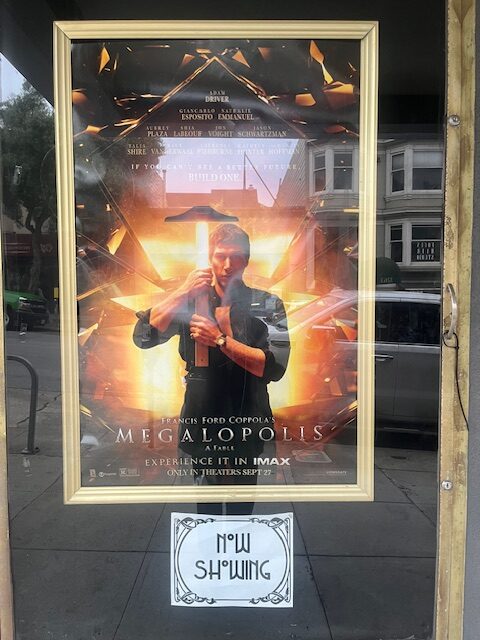Film critics the world over concur that Francis Ford Coppola’s latest effort, Megalopolis, is a disaster.
Even in his home town of San Francisco, the reviews have not been kind, and it seems that locals have been quick to observe that he may have squandered $120 Million of his own money on the doomed project.
While Coppola has attained legendary status for such masterpieces as The Conversation, The Godfather Trilogy and Apocalypse Now, he flamed out on Dracula, and failed completely with One From the Heart and The Cotton Club. Throughout his career, though, he’s been known for being a risk taker.
The premise of his most recent tale must have been hard to resist. The demise of “New Rome” is staged on an epic scale, mirroring the anxiety many Americans feel about living in a failed state.
Adam Driver is the tortured Nobel-winning protagonist Cesar Catailina, attempting to make time stand still as circumstances overwhelm him. He introduces a new cryptic material called “Megalon” to achieve his dreams of power… a constant theme in this drama.
Indeed, “Power to the People,” is a refrain heard repeatedly in the mob scenes of this movie. Its politics are muddled, which can only alienate most local movie fans who are not deeply divided when it comes to choosing our next Ceasar…and a utopian future.
Would Coppola have met with some success if he had framed the narrative as a celebration of unbridled liberalism? Not likely.
But here’s another suggestion: ditch the movie and reproduce the work as an opera.
This art form embraces paradox and ambiguity.
After all, Coppola is no stranger to opera. According to reports following the film’s debut at Cannes, the director even considered screening the next event in an open air theatre in the U.S. modeled after Wagner’s Bayreuth. (And who can forget the “Ride of the Valkyries” segment in his haunting Vietnam war classic?
In 1982, Coppola presented a live performance of Napoleon at the Kennedy Center Opera House with the score conducted by the composer, Carmine Coppola. The Godfather: Part III (1990) features the “Intermezzo” from Cavalleria Rusticana.
Music scholars contend, finally, that Coppola was deeply influenced by Italian opera from filmmakers Luchino Visconti and Bernardo Bertolucci. His first Godfather has been likened to chestnuts like “Marriage of Figaro” and “La Traviata.”
One would hope that if he has one more work of art to produce before calling it quits, he goes for broke and sets the stage for a final curtain at an opera venue in Rome or San Francisco.

